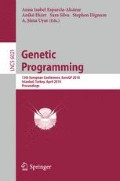Abstract
We propose a new framework based on Genetic Programming (GP) to automatically decompose problems into smaller and simpler tasks. The framework uses GP at two levels. At the top level GP evolves ways of splitting the fitness cases into subsets. At the lower level GP evolves programs that solve the fitness cases in each subset. The top level GP programs include two components. Each component receives a training case as the input. The components’ outputs act as coordinates to project training examples onto a 2-D Euclidean space. When an individual is evaluated, K-means clustering is applied to group the fitness cases of the problem. The number of clusters is decided based on the density of the projected samples. Each cluster then invokes an independent GP run to solve its member fitness cases. The fitness of the lower level GP individuals is evaluated as usual. The fitness of the high-level GP individuals is a combination of the fitness of the best evolved programs in each of the lower level GP runs. The proposed framework has been tested on several symbolic regression problems and has been seen to significantly outperforming standard GP systems.
Access this chapter
Tax calculation will be finalised at checkout
Purchases are for personal use only
Preview
Unable to display preview. Download preview PDF.
References
Koza, J.R.: Genetic Programming II: Automatic Discovery of Reusable Programs. MIT Press, Cambridge (May 1994)
Angeline, P.J., Pollack, J.B.: The evolutionary induction of subroutines. In: Proceedings of the Fourteenth Annual Conference of the Cognitive Science Society, Bloomington, Indiana, USA, pp. 236–241. Lawrence Erlbaum, Mahwah (1992)
Spector, L.: Evolving control structures with automatically defined macros. In: Siegel, E.V., Koza, J.R. (eds.) Working Notes for the AAAI Symposium on Genetic Programming, November 10–12, pp. 99–105. MIT/AAAI, Cambridge (1995)
Rosca, J.P., Ballard, D.H.: Discovery of subroutines in genetic programming. In: Angeline, P.J., Kinnear Jr., K.E. (eds.) Advances in Genetic Programming 2, ch. 9, pp. 177–202. MIT Press, Cambridge (1996)
Seront, G.: External concepts reuse in genetic programming. In: Siegel, E.V., Koza, J.R. (eds.) Working Notes for the AAAI Symposium on Genetic Programming, November 10–12, pp. 94–98. MIT/AAAI, Cambridge (1995)
Jonyer, I., Himes, A.: Improving modularity in genetic programming using graph-based data mining. In: Sutcliffe, G.C.J., Goebel, R.G. (eds.) Proceedings of the Nineteenth International Florida Artificial Intelligence Research Society Conference, Melbourne Beach, Florida, USA, May 11-13, pp. 556–561. American Association for Artificial Intelligence (2006)
Hemberg, E., Gilligan, C., O’Neill, M., Brabazon, A.: A grammatical genetic programming approach to modularity in genetic algorithms. In: Ebner, M., O’Neill, M., Ekárt, A., Vanneschi, L., Esparcia-Alcázar, A.I. (eds.) EuroGP 2007. LNCS, vol. 4445, pp. 1–11. Springer, Heidelberg (2007)
McPhee, N.F., Crane, E.F., Lahr, S.E., Poli, R.: Developmental plasticity in linear genetic programming. In: Raidl, G., et al. (eds.) GECCO 2009: Proceedings of the 11th Annual conference on Genetic and evolutionary computation, Montreal, July 8-12, pp. 1019–1026. ACM, New York (2009)
Rosca, J., Johnson, M.P., Maes, P.: Evolutionary Speciation for Problem Decomposition (1996) (Available via Citeseer)
Iba, H.: Bagging, boosting, and bloating in genetic programming. In: Proceedings of the Genetic and Evolutionary Computation Conference, Orlando, Florida, USA, July 13-17, vol. 2, pp. 1053–1060. Morgan Kaufmann, San Francisco (1999)
Jackson, D.: The performance of a selection architecture for genetic programming. In: O’Neill, M., Vanneschi, L., Gustafson, S., Esparcia Alcázar, A.I., De Falco, I., Della Cioppa, A., Tarantino, E. (eds.) EuroGP 2008. LNCS, vol. 4971, pp. 170–181. Springer, Heidelberg (2008)
Poli, R., Langdon, W.B., McPhee, N.F.: A Field Guide to Genetic Programming (With contributions by J. R. Koza) (2008), http://lulu.com
Han, J., Kamber, M.: Data mining: concepts and techniques. Morgan Kaufmann, San Francisco (2006)
Sepulveda, F., Meckes, M., Conway, B.A.: Cluster separation index suggests usefulness of non-motor EEG channels in detecting wrist movement direction intention. In: Proceedings of the 2004 IEEE Conference on Cybernetics and Intelligent Systems, Singapore, pp. 943–947. IEEE Press, Los Alamitos (2004)
Muni, D.P., Pal, N.R., Das, J.: A novel approach to design classifier using genetic programming. IEEE Transactions on Evolutionary Computation 8(2), 183–196 (2004)
Boric, N., Estevez, P.A.: Genetic programming-based clustering using an information theoretic fitness measure. In: Srinivasan, D., Wang, L. (eds.) 2007 IEEE Congress on Evolutionary Computation, Singapore, September 25-28. IEEE Computational Intelligence Society, pp. 31–38. IEEE Press, Los Alamitos (2007)
Peacock, J.A.: Two-dimensional goodness-of-fit testing in astronomy. Royal Astronomical Society, Monthly Notices 202, 615–627 (1983)
Author information
Authors and Affiliations
Editor information
Editors and Affiliations
Rights and permissions
Copyright information
© 2010 Springer-Verlag Berlin Heidelberg
About this paper
Cite this paper
Kattan, A., Agapitos, A., Poli, R. (2010). Unsupervised Problem Decomposition Using Genetic Programming. In: Esparcia-Alcázar, A.I., Ekárt, A., Silva, S., Dignum, S., Uyar, A.Ş. (eds) Genetic Programming. EuroGP 2010. Lecture Notes in Computer Science, vol 6021. Springer, Berlin, Heidelberg. https://doi.org/10.1007/978-3-642-12148-7_11
Download citation
DOI: https://doi.org/10.1007/978-3-642-12148-7_11
Publisher Name: Springer, Berlin, Heidelberg
Print ISBN: 978-3-642-12147-0
Online ISBN: 978-3-642-12148-7
eBook Packages: Computer ScienceComputer Science (R0)

